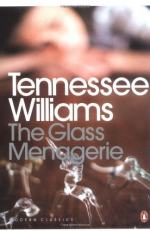|
This section contains 1,941 words (approx. 7 pages at 300 words per page) |

|
Repetition of Themes and Characters in Tennessse Williams's Works
Summary: Tennessee Williams reused plot lines and characters from his early and best play, "The Glass Menagerie," to produce his later works, such as "A Streetcar Named Desire." Most of the changes involved villanious characters becoming more outrageous.
In an effort to recreate the success he found with The Glass Menagerie, Tennessee Williams' subsequent plays share similar characters and themes but are somewhat original because of their darker contents. Tennessee Williams reuses plot lines like the American dream, the southern society, and the downfall of the characters. His work becomes increasingly repetitive; the only difference is that the villains became more villainous, while the actions became more vicious. (Weales, 21) Williams' heroes are always those who do not have a place in society and whose dreams are different from others. The reasons why the hero is an outcast become more prominent in his later plays. Because of his habit of type-casting, Williams misses the opportunity to create even more powerful characters and themes in his works.
The Glass Menagerie was Tennessee Williams' Broadway debut and his first success, and still his best play. It was playing to...
|
This section contains 1,941 words (approx. 7 pages at 300 words per page) |

|


